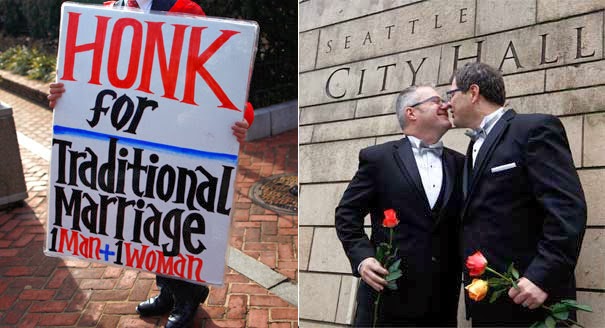So,
is the cultural and legal sea change toward same-sex marriage a
portent for unraveling of traditional marriage as we have known it?
 Of
course it is. You must decide yourself, according to your own beliefs and conscience, whether that is a bad thing or some sort of societal leap forward.
Of
course it is. You must decide yourself, according to your own beliefs and conscience, whether that is a bad thing or some sort of societal leap forward.
I
can hear the cries of "hater!" and "bigot!" now,
but hear me out: my opening statement is rational and, to my mind,
irrefutably logical.
In
the past two weeks in the state of Utah, arguably the bastion of all
things conservative and where voters overwhelmingly voted to limit
marriage legally to one man and one woman, not less than TWO court
decisions have turned the world on its head, marriage-wise.
Both
came from the federal courts. First, a judge gutted Utah's long-time
law banning polygamous marriages (a historical move that cleared the
way for statehood more than a century ago, when the Mormon prophet
gave up the doctrine of plural marriage).
Equal
protection under the law, and the inability of the state to argue the
harm to society, et al, were keys to that decision.
Ditto
for another federal judge's decision late last week striking down the
state's ban on same-sex marriage.
Monday
morning, hundreds of gays and lesbians lined up at courthouses to get
their licenses, where clerks were under orders to comply with the ruling.
Of
course, the state of Utah is appealing both decisions. But the
historical course is inevitable. Both
decisions, sooner or later, will be upheld.
This fight may not be over, but it is decided.
The
next battleground could, and likely will be whether, and to what extent, business owners
and churches can exercise their faith-based resistance to the morphing definition
of marriage.
Talking whether a bakery or caterer can legally bow out of a same-sex event, or whether a church can keep its tax-exempt status, or ability to perform "legal" marriages, if it does not conform to the politically correct tides.
Talking whether a bakery or caterer can legally bow out of a same-sex event, or whether a church can keep its tax-exempt status, or ability to perform "legal" marriages, if it does not conform to the politically correct tides.
Same-sex
marriage/rights advocates argue that will never happen . . . just as
they did that approving same-sex marriage rights would not have a
slippery slope effect where polygamy would benefit from the same
arguments.
What
IS marriage, legally? It IS, regardless the apologists' who insist
the LGBT Pandora's Box has not been toppled, a definition that is now
wide open . . . if not in actuality now, inevitably later.
If
same-sex marriage is legal, and if polygamy is legal, where are the
restrictions for anyone, other than minors, engaging in this particular legal contract, etc.?
Why
not, then, a bisexual/polygamous marriage or any other variation of
genders and numbers of partners?
Any attempt to place limits on marriage, by any definition, will be mortally wounded by the same arguments that got us to this point.
Any attempt to place limits on marriage, by any definition, will be mortally wounded by the same arguments that got us to this point.
Decades
ago, I read a science fiction series where in marriages varied by
gender, number and even the definition of what was "human."
One
"family" consisted of a man who had cloned himself multiple
times, at various ages, and married him-selves as well as other men
and women and artificial intelligences.
Then,
I thought: What an imagination!
Now?
Not so much.
I
don't have the answers to this whole thing. And I refuse to be the
judge of others. Not my job.
But
as an historian, and a believer, I have to observe that when
spiritually informed morality is removed from the societal equation,
as we seem to have done with our secular society, the very fabric of
its institutions can become, certainly, unrecognizable, and perhaps
unraveled . . . if not in present fact, then possibly in future
reality.
No comments:
Post a Comment